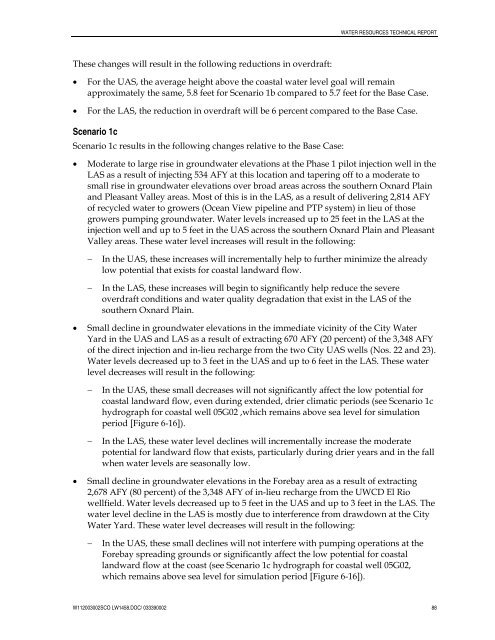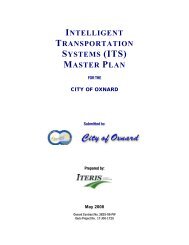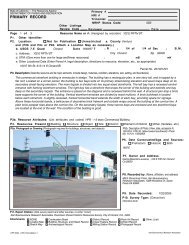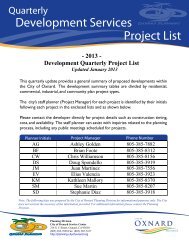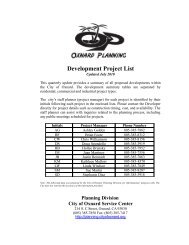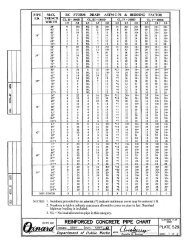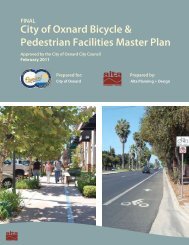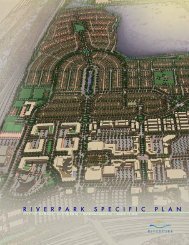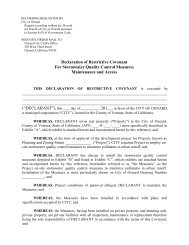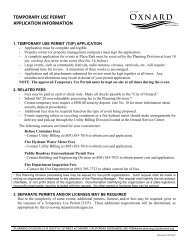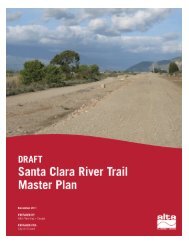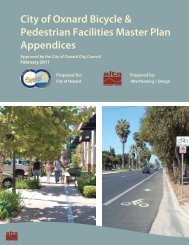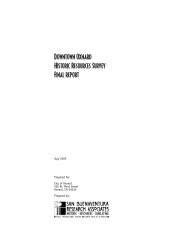View File - Development Services - City of Oxnard
View File - Development Services - City of Oxnard
View File - Development Services - City of Oxnard
Create successful ePaper yourself
Turn your PDF publications into a flip-book with our unique Google optimized e-Paper software.
WATER RESOURCES TECHNICAL REPORTThese changes will result in the following reductions in overdraft:• For the UAS, the average height above the coastal water level goal will remainapproximately the same, 5.8 feet for Scenario 1b compared to 5.7 feet for the Base Case.• For the LAS, the reduction in overdraft will be 6 percent compared to the Base Case.Scenario 1cScenario 1c results in the following changes relative to the Base Case:• Moderate to large rise in groundwater elevations at the Phase 1 pilot injection well in theLAS as a result <strong>of</strong> injecting 534 AFY at this location and tapering <strong>of</strong>f to a moderate tosmall rise in groundwater elevations over broad areas across the southern <strong>Oxnard</strong> Plainand Pleasant Valley areas. Most <strong>of</strong> this is in the LAS, as a result <strong>of</strong> delivering 2,814 AFY<strong>of</strong> recycled water to growers (Ocean <strong>View</strong> pipeline and PTP system) in lieu <strong>of</strong> thosegrowers pumping groundwater. Water levels increased up to 25 feet in the LAS at theinjection well and up to 5 feet in the UAS across the southern <strong>Oxnard</strong> Plain and PleasantValley areas. These water level increases will result in the following:−−In the UAS, these increases will incrementally help to further minimize the alreadylow potential that exists for coastal landward flow.In the LAS, these increases will begin to significantly help reduce the severeoverdraft conditions and water quality degradation that exist in the LAS <strong>of</strong> thesouthern <strong>Oxnard</strong> Plain.• Small decline in groundwater elevations in the immediate vicinity <strong>of</strong> the <strong>City</strong> WaterYard in the UAS and LAS as a result <strong>of</strong> extracting 670 AFY (20 percent) <strong>of</strong> the 3,348 AFY<strong>of</strong> the direct injection and in-lieu recharge from the two <strong>City</strong> UAS wells (Nos. 22 and 23).Water levels decreased up to 3 feet in the UAS and up to 6 feet in the LAS. These waterlevel decreases will result in the following:−−In the UAS, these small decreases will not significantly affect the low potential forcoastal landward flow, even during extended, drier climatic periods (see Scenario 1chydrograph for coastal well 05G02 ,which remains above sea level for simulationperiod [Figure 6-16]).In the LAS, these water level declines will incrementally increase the moderatepotential for landward flow that exists, particularly during drier years and in the fallwhen water levels are seasonally low.• Small decline in groundwater elevations in the Forebay area as a result <strong>of</strong> extracting2,678 AFY (80 percent) <strong>of</strong> the 3,348 AFY <strong>of</strong> in-lieu recharge from the UWCD El Riowellfield. Water levels decreased up to 5 feet in the UAS and up to 3 feet in the LAS. Thewater level decline in the LAS is mostly due to interference from drawdown at the <strong>City</strong>Water Yard. These water level decreases will result in the following:−In the UAS, these small declines will not interfere with pumping operations at theForebay spreading grounds or significantly affect the low potential for coastallandward flow at the coast (see Scenario 1c hydrograph for coastal well 05G02,which remains above sea level for simulation period [Figure 6-16]).W112003002SCO LW1458.DOC/ 033390002 88


